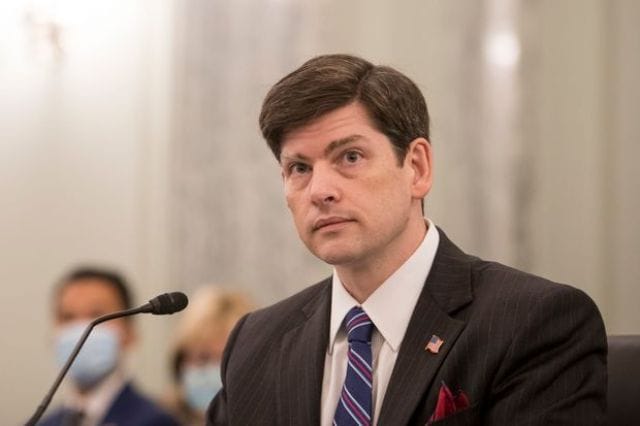FCC Adds Items to January Agenda, US Telecom on Broadband Emergency, Fiber Broadband Board
January 7, 2021 – The Federal Communications Commission’s January 13 meeting will be Commissioner Nathan Simington’s first and Chairman Ajit Pai’s last. As Pai has opted not to place any Section 230 action on the January meeting agenda and Simington’s office has issued a statement saying “no grounds
Jericho Casper

January 7, 2021 – The Federal Communications Commission’s January 13 meeting will be Commissioner Nathan Simington’s first and Chairman Ajit Pai’s last.
As Pai has opted not to place any Section 230 action on the January meeting agenda and Simington’s office has issued a statement saying “no grounds were identified for recusal on this topic at this time,” it seems unlikely that the issue of Section 230 of the Communications Decency Act will be pushed.
While Section 230 has never been more critical to handle, after rampant disinformation and incitement online resulted in violent Capitol breaches on Wednesday, it has been long debated whether it is in the FCC’s jurisdiction to propose changes to the Act, which protects online platforms from the content third-party users post.
While the FCC likely won’t be tackling issues revolving around Section 230 next Wednesday, the Commissioners will summarize the work of the FCC over the past four years and consider three items recently announced.
First on the docket, the agency plans to announce the first round of selections for the Commission’s $100 million Connected Care Pilot Program to provide Universal Service Fund support for health care providers making connected care services available directly to patients, with an emphasis on serving veterans and low-income Americans.
The agency further plans to issue a Notice of Proposed Rulemaking to seek comment on whether to allow mobile services to operate in the 12.2-12.7 Gigahertz band. The Notice would seek input on possible methods for assigning new flexible-use rights while protecting incumbent users, and also on whether the costs of accommodating new services in the band would exceed the benefits.
Finally, the agency will issue a Public Notice to seek comment on competitive bidding procedures for Auction 108, an auction for flexible-use, geographic overlay licenses for counties with white spaces in the 2.5 Gigahertz band.
US Telecom offers suggestions on Emergency Broadband Benefit program
US Telecom, a national trade association representing technology providers, innovators, suppliers, and manufacturers, was quick to respond to the FCC’s call for input on how to best utilize the $3.2 billion Emergency Broadband Benefit Program, which Congress recently allocated funding for in the Consolidated Appropriations Act of 2021.
As Congress has provided 60 days for the Commission to stand-up the program, time is of the essence.
US Telecom recommends in order to move quickly, but also deliver a successful and efficient program, that the Commission should utilize existing resources, build flexibility into the program’s implementation, and plan for transitions from the outset.
US Telecom calls for the agency to expand its existing Lifeline program, writing that “the Commission and USAC have already undertaken a significant amount of work to establish the Lifeline National
Eligibility Verifier and National Lifeline Accountability Database.” US Telecom urges the Commission to use them as the primary federal tool for providers to verify participants in all states.
US Telecom’s letter further motivates the FCC to keep the program simple, saying “the simpler the Commission can make the program to implement, the more effective it will be.”
The letter also argues that flexibility is an important characteristic of the program. “Given the emergency nature of this program, broadband providers will also be doing the internal work required to participate concurrently, so they will require some level of flexibility and optionality to adapt it to their existing plans and systems. Providing that flexibility will maximize participation and help ensure consumers receive the benefits Congress intended,” it reads.
The Fiber Broadband Association announces new Board of Directors
The Fiber Broadband Association announced Wednesday it has elected its 2021 Board of Directors.
Katie Espeseth, vice president of new products at EPB, was re-elected as Chair of the Board for another one-year term, which began January 1.
As part of the officer elections held at the December board meeting, the board elected its 2021 Management Committee which includes, in addition to Espeseth: Kevin Morgan of Clearfield as vice chair; Gregg Logan of C Spire as secretary; and Joe Jensen of Corning as treasurer.
The full 2021 Board of Directors includes Espeseth, Morgan, Logan, and Jensen, as well as, Joseph “JJ” Jones, executive vice president of On Trac, Inc.; Teles Fremin, chief communications engineer at LUS; Joanne Hovis, president of CTC Technology & Energy; Mark Boxer, technical manager at OFS; and Craig Stein, vice president of Americas and head of global business development at ADTRAN.
“2020 created many new challenges for everyone, but it also created enormous opportunities for broadband. Our Board of Directors plays a critical role in guiding our industry to address the rapidly evolving needs for fiber broadband connectivity—whether it be for remote work, education, or healthcare,” said Gary Bolton, President and CEO of FBA.
“FBA is fortunate to welcome our 2021 Board of Directors and have Katie’s leadership for a second term. Each Board member brings extensive and unique experience to our organization that we’ll leverage to identify the right path to speed the deployment of fiber-based networks in every corner of the Americas for a true broadband experience.”









Member discussion